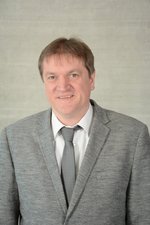The goal of CO2-neutral and resource-efficient cities is an important building block against climate change. Cities generate about 80% of energy demand and greenhouse gas emissions. This is exactly where the large research network "ENsource" comes in – it stands for "Urban Energy Systems and Resource Efficiency". Researchers presented case studies, digital tools and results of the project at a virtual event. The HFT Stuttgart coordinated the large network.
"With the results and case studies in rural and urban areas and industrial sites, we want to show ways in which ENsource supports climate change in Baden-Württemberg," said Prof. Dr. Volker Coors, ENsource project manager and Scientific Director of the Institute for Applied Research (IAF) at HFT Stuttgart. Eight universities, two universities and two non-university research institutions worked together in the ENsource research network. In the funding phase from 2014 to 2020, the MWK Baden-Württemberg provided 1.25 million euros in funding from the state and 1.25 million euros from the European Regional Development Fund (ERDF).
Tools for energy managers, planners and environmental engineers
A variety of digital tools were developed through interdisciplinary collaboration. The ENsource researchers from the fields of engineering, computer science, urban planning, architecture, and forestry and agriculture presented via their case studies how the tools can be combined and widely implemented based: in rural areas (case studies Mainau and Rainau) and in urban areas (case studies Stuttgart and Mannheim). The tools were also tested at an industrial site – in Schwieberdingen (Bosch). The tools are now intended to help energy managers, planners and environmental engineers make decisions on how to plan their energy systems in the neighborhoods in advance. This involves computer-aided modeling, simulation and optimization.
Minister Bauer: "Highly relevant topic for the future".
In her welcoming address, Minister Theresia Bauer (MWK Baden-Württemberg) emphasized the timeliness and relevancy of the project: "In view of dwindling fossil energy reserves, demographic development and climate change, the research association is dealing with the key issues for the cities of the next generation: resource efficiency and the urgently needed energy transition." The research project, coordinated by HFT Stuttgart, is taking on a pioneering role, the minister said. Universities in Baden-Württemberg have experienced a very dynamic development in applied research in recent years. Today, there are renowned research working groups in many areas of expertise at the universities in the state, one of which is the Center for Applied Research Urban Energy Systems and Resource Efficiency at HFT Stuttgart.
HFT president Katja Rade made the connection to the UN Sustainable Development Goals (SDGs). "ENsource has a very large positive impact on what is perhaps the most important UN goal – to breathe new life into the global partnership for sustainable development," said the rector.
Research and transfer: "Pilot projects" in Real Communities
The definitive questions that the ENsource network asked itself included: How can as much electricity and heat as possible be generated from renewable energies? How can energy sources such as photovoltaics, solar thermal energy, wind power or bioenergy be combined in a meaningful way to achieve this? How can the course be set early enough in the planning stage so that heat demand is reduced at the neighborhood level?
ENsource’s unique feature of having actually tested the developed tools in real city quarters and municipalities was addressed by Prof. Dr. habil. Ursula Eicker from Concordia University Montreal (CUM), Canada. Ursula Eicker previously launched ENsource five years ago, before she was appointed to the Canada Excellence Research Chair for Smart, Sustainable and Resilient Cities and Communities. "The pilot projects are still a long way from reaching the wider community," she stressed. Now, she said, the pilot projects need further scientific support to show what the cost-benefit balance looks like. She recommended continuing to work on the existing projects through the established partnerships in order to move forward. With a nod to the funding agencies, she pointed out that a funding logic of two to three years may not work, especially in the long-term planning and building of neighborhoods.
The next step is to implement the pilot projects across the board and to get the municipal heating planning companies involved as well, said Prof. Dr. Bernd Thomas, Scientific Director of the Reutlingen Research Institute of the HS Reutlingen, a member of the research network. He said it was already a transfer achievement that the case studies were conducted in real neighborhoods with partners from within those neighborhoods.
HFT president Prof. Dr. Katja Rade addressed the knowledge transfer of the project and the opportunities, possibilities and potentials to transfer the local findings to the global level.
ENsource will continue to have an impact beyond the duration of the project: "We, while bringing with us the expertise embodied in the network, are happy to be available a service provider," said Prof. Dr. Volker Coors. He announced that workshops for municipal planners for the SimStadt tool developed at HFT Stuttgart will be held in the future.
The event was moderated by ENsource Project Manager Bettina Petzold and Transfer Manager Irina Kohlrautz (M4_LAB at HFT Stuttgart).
ENsource – HAW – Partner universities
| Aalen University Biberach University Heilbronn University Mannheim University Pforzheim University Reutlingen University Rottenburg University of Applied Sciences Stuttgart University of Applied Sciences |
(Extra)university partners | Fraunhofer ISE University of Stuttgart INATECH – Institute for Sustainable Technical Systems ZSW: Center for Solar Energy and Hydrogen Research Baden-Württemberg |
Further info: Ensource website
Publication for municipalities and companies The publication of the results in book form was completed in time for the event. It is aimed at municipalities, engineering, especially planning offices, researchers, energy consultants, environmental officers and is available in open access: Volker Coors (ed.): BW Forschungsverbund ENsource: Urbane Energiesyseme und Ressourceneffizienz – ENsource, Fraunhofer Verlag, Stuttgart 2021. link |
![[Image: Nadine Roßa, Berlin]](/fileadmin/Dateien/Forschung/_processed_/3/5/csm_Ensource-Fallstudien_055f57a424.png)
![[Image: Nadine Roßa, Berlin]](/fileadmin/Dateien/Forschung/_processed_/5/1/csm_Ensource-Cities_4928f74e70.png)
![[Image: HFT]](/fileadmin/Dateien/Forschung/_processed_/0/f/csm_ENSource_Abschlussveranstaltung_2aca97d998.jpg)
![[Image: Nadine Roßa, Berlin]](/fileadmin/Dateien/Forschung/_processed_/3/5/csm_Ensource-Fallstudien_e6aa9cabdc.png)
